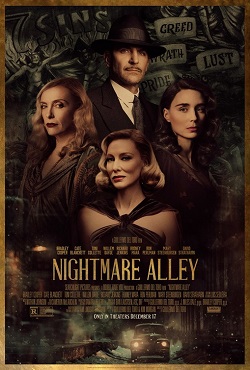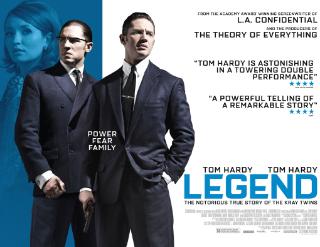In March, CODA won the Oscar for Best Picture.
By May, I think most people had forgotten about it.
I point this out not to be snarky about CODA (which, for the most part, I found to be a well-made and sweet-natured movie) but to just point out that occasionally, the Oscar for Best Picture Of The Year does not go to the nominee that’s necessarily going to be remembered and watched by future generations. CODA’s victory is not a travesty, regardless of what some members of Film Twitter insisted. This isn’t like when Green Book won. It’s just that CODA seems to be destined to be remembered in much the same way that we remember Argo and Spotlight, i.e. a well-made and well-acted film that gets the job done but don’t necessarily stick around in your mind for long after you watch it.
In fact, looking back at all of the 2021 Best Picture nominees, the one that has really stuck with me is Guillermo del Toro’s Nightmare Alley.
Nightmare Alley tells the story of Stan Carlisle (Bradley Cooper), a drifter who, in 1939, gets a job with a carnival. Stan is running from his past. He’s haunted by visions and dreams of a dying old man and a burning farm house. When we first meet him, he avoids alcohol which is perhaps a good thing as getting drunk at the carnival just makes someone easier to exploit and, ultimately, the carnival is all about exploitation. The carnival’s owner, Clem (Willem DaFoe), specializes in tricking alcoholics into becoming opium-addicted “geeks,” who bite the heads off of chickens for gawking country audiences.
It’s not a glamorous life but it’s one that allows Stan to hide from his past. He comes under the tutelage of Madame Zeena (Toni Collette) and her husband, Pete (David Straithairn). They teach him how to give “cold readings,” and Stan proves to be an eager student. Pete tells Stan to never pretend to be able to speak to the dead and, from the minute that Pete says it, we can tell that Stan is already thinking about how much money he could make by doing just that. Stan also appears to fall in love with Molly (Rooney Mara), a performer whose act involves a fake electric chair. When Stan eventually abandons the carnival, Molly goes with him. When Stan finds success as a fake medium, Molly is his assistant.
Stan becomes quite a success in Buffalo, trading in his shabby clothes and his unshaven appearance for a tuxedo and suave mustache. With success comes arrogance and Stan soon ignore what Pete told him about pretending to be able to speak to the dead. When Stan meets a psychologist named Dr. Lillian Rith (Cate Blanchett), he gets involved in a plot to con a judge who is still mourning for his deceased son. It also leads to Stan meeting a corrupt and murderous businessman (Richard Jenkins). Ignoring Pete’s lesson sets off a chain of events that leads Stan right back to where he started.
There’s something wonderfully subversive about taking Bradley Cooper, a legitimate movie star who is probably one of the most personable and likable actors working today, and casting him as such a sleazy character. This isn’t a case, as in American Hustle or even The Hangover movies, where Cooper is playing a goof who gets in over his head. Instead, Stan is someone who uses his eager manner and his natural charm to cover up the fact that he’s hollow on the inside. Watching the film, you’re never quite sure as to whether or not Stan truly cares about any of the people who come into his life. Does he love Molly or is he just using her? Does he care about his friends from the carnival or is he just manipulating them into acting as a shield to keep out his former life? When he goes against Pete’s lessons about pretending to speak to the dead, is he motivated by greed or arrogance? Or does he truly want to believe that he’s somehow become the all-powerful psychic that he pretends to be? Stan becomes a success because he knows how to con everyone but eventually, he meets someone who is even emptier than he is. Ultimately, Stan cons himself. He tricks himself into believing that he’s more clever than he actually is and he ends up facing the fate that he secretly always knew was waiting for him. Cooper gives an outstanding performance as Stan. Both he and del Toro cleverly play with what audiences expect when they see Bradley Cooper onscreen. In the end, the film suggests that not even charm can ward off karma.
Nightmare Alley is work of what Lucio Fulci called “pure cinema,” one in which the imagery and the emotions generated by that imagery is even more important than the story itself. The sets, whether it’s the carnival or Dr. Ritter’s office or the Buffalo ballroom where Stan cons the wealthy, are large and ornate. The cinematography is gorgeous. The supporting performances are arch and witty. Cate Blanchett’s and Rooney Mara’s costumes are to die for. Nearly every shot feels as if it could have been lifted from a particularly vivid dream. Guillermo del Toro’s love of cinema is evident in every frame of Nightmare Alley. It’s a film that celebrates the grandeur and the power of imagination and also warns about the destructive power of hubris. Despite the fact that del Toro has gone on the record saying that there’s nothing supernatural about Nightmare Alley, it’s still a wonderful film for the Halloween season. The costumes are beautiful and the final third of the movie plays like an homage to the classic German expressionistic horror films, with Blanchett playing her role as a mix of Dr. Caligari and a classic noir feeme fatale. Nightmare Alley is a big, flamboyant, and unforgettable work of pure cinema and, looking back, it’s my favorite film of 2021.
It’s a film that stays with you.







